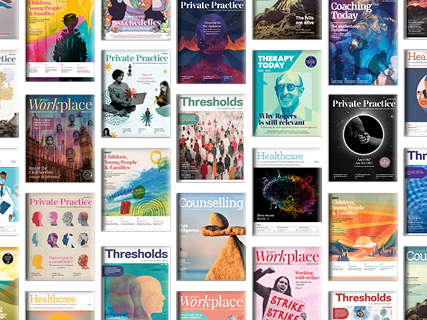As the cost of living rises and pressure on mental health services increases and personal budgets tighten, how can we as practitioners preserve space for reflection amongst the clinical demand in our practices? Are our opportunities to do so in decline? How do we safeguard this important aspect of our roles and in doing so ensure best practice for our clients?
Therapists governed by accrediting bodies are rightly asked to maintain minimum CPD hours to support the development of our practice, and those of us working for mental health services will have additional service-specific risk and training requirements. These necessary, mandatory demands are prescriptive in ensuring minimum therapist standards for the protection of our clients – but what about sacred spaces for reflection for our personal and professional processes?
The therapy room acts as a transitional container where clients are able to safely co-create new meanings with a professional other. Being-in-relation-to, sparks a bi-directional process unlocking intrapsychic and interpersonal relating, giving birth to new inspiration and making meanings. An increasing move towards digital working has opened the doors of access to a wider number of opportunities for clients and therapists, however, a growing number of therapists are experiencing decreasing contact with colleagues and peers outside of statutory provisions.
Therapist peers have shared with me that they strongly mourn a loss of connection with others from their tribe, and their therapeutic practitioner families. As we are aware of the growing financial limitations due to the cost-of-living crisis, many are struggling to afford the longer-term additional training, which has traditionally called us together to meet for personal and professional development.
Do you recognise a need for this in your own work? I suggest three ingredients to create a therapeutic Temenos (a sacred enclosure), you can:
- meet in person if you can, nothing beats the tangible experience of being in the room, and when you do, really bring yourself into the process, it has become so easy to hide behind cameras or cancel last minute. Trust and commit to the process of growth and individuation, what part of your practice needs attending to? What are you neglecting? What won’t you say? Trust your professional others to support and guide you
- seek appropriate, regular, nourishing spaces which inspire discussion and change. Do you work in the NHS? Maybe the focus of your space is more about appropriate time, go for first thing in the morning if it feels better
- be open to using creative methods such as art, story writing or music to explore the unspoken parts of your experience. Poetry, drumming or even a group experience can hold a mirror to the professional aspects which need developing or tending to
Read more...

BACP divisions
Our divisions represent and promote specific areas of interest within the counselling professions, providing specialist resources, events and networking.

BACP journals
We publish nine general and special interest journals for counsellors and psychotherapists, including our award-winning Therapy Today.

Blogs and vlogs 2023
News and views from members, staff and clients
